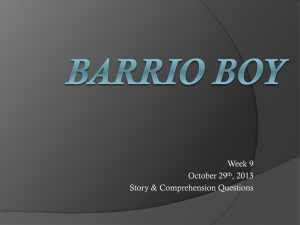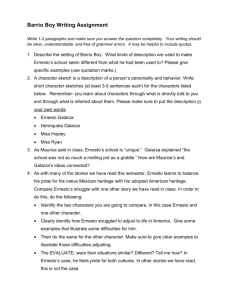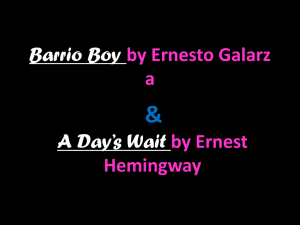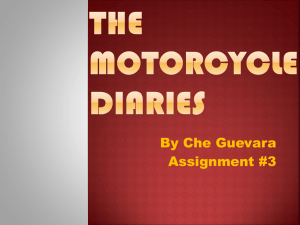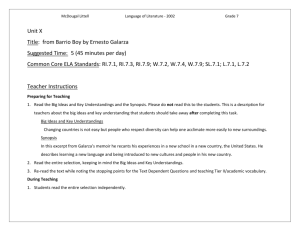Barrio Boy - QZAB Teachers
advertisement
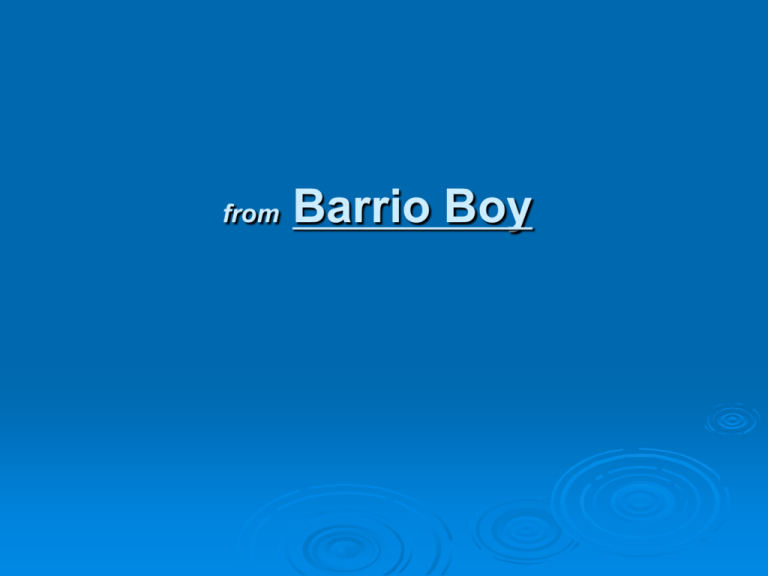
from Barrio Boy Fiction Prose writing that tells about imaginary characters and events. Novels Novellas Short stories Nonfiction Prose writing that presents and explains ideas or that tells about real people, places, objects, or events. News articles Essays Historical accounts What is prose? Prose is the ordinary form of written language. Most writing that is not poetry, drama, or song is considered prose. Prose is one of the genres, or forms, of literature and occurs both in fiction and nonfiction. Literary Terms Narrator - a person who tells the story Characters - the people living the story Dialogue - the conversations that the characters have Events - make up the action in the story Compare and Contrast Barrio Boy Real characters Both A Day’s Wait Characters Imaginary characters reassuring adj., having the effect of restoring confidence The sound of applause was reassuring to the nervous performer. contraption n., device or machine regarded as strange I don’t think that it is safe to drive that rickety contraption. formidable adj., impressive The titles on the long summer reading list were formidable. epidemic n., outbreak of a contagious disease The flu epidemic caused school to close. flushed v., drove out from hiding The dogs flushed birds out of the bushes. evidently adv., clearly; obviously The dark clouds evidently promised rain. miserable adj., causing great discomfort or unhappiness The sick and miserable boy was not able to attend school. various adj., different He had to take various medications to get over the illness. menace n., a threat or danger John had to decide if the man was a friend or a menace. absolutely adv., completely; totally without limit He was absolutely sure this was the silliest thing he had ever seen! Think of a time when you had a new experience, such as moving to a new town or neighborhood. Maybe you joined a sports team or joined a new club. What did that feel like? What were some of your thoughts both before and during the experience? Use some of the following words: comprehend, focus, interpret, respond, distort. Ernesto Galarza 1905 - 1984 When Ernesto Galarza was eight, he and his parents migrated to Sacramento, California, where he worked as a farm laborer. Excelling at school, he became one of the first Mexican-Americans from a poor background to complete college, after which he received a M.A. from Stanford in 1929, and a Ph.D. in history from Columbia University in 1944. Galarza returned to California, where—at the height of the Cold War and McCarthyism—he organized unions for farm laborers, joining the effort to create the first multiracial farm worker union. While this effort failed, it created the foundation for the United Farm Workers Union of the 1960s. He wrote several books, most notably the 1964 Merchants of Labor, on the exploitation of Mexican contract workers, and the 1971 Barrio Boy, about his own childhood. He was nominated for the Nobel Prize in Literature in 1976. from Barrio Boy by Ernesto Galarza Young Ernesto from Mexico had just arrived in the United States and at Lincoln School. On his first day, a formidable but friendly principal and her young interpreter greet Ernesto and his mother. His kind, supportive teacher continues the process of welcoming him to his new country and helping him with his new language. Ernesto and the other immigrant children form a bond as they learn English and adapt to their new lives. The school staff guides them to take pride in their diverse backgrounds. Look carefully at the expression on this boy’s face. What emotions do you think he is feeling? Does this picture convey the emotions that a child might feel as he enrolls in a new school? Why? What is a Barrio? A barrio is a part of a town or city where most of the people are Hispanic. Who is the narrator of this work? 1st person or 3rd person? How can you tell? Where do the narrator and his mother go? Where are they? The boy and his mother have gone to his new school. They have entered the office of Miss Nettie Hopley, the school principal. Describe the classroom in the photograph on page 72. How does this compare with the narrator’s impressions of school? The classroom looks like a friendly, inviting place with a nice teacher. This is not how Ernesto feels about his classroom or his teacher when he first arrives at school; at first he is scared. withering (pg. 72) Use context clues to determine the meaning of this word. “She was, to skinny, somewhat runty me, of a withering height when she patrolled the class. What words describe how young Ernesto is feeling during the days at school in this country? Secure (when his mother is there) Afraid (when his mother leaves) What happens that makes Ernesto’s feeling start to change? His feelings begin to change when begins to be able to read and speak English. He stops being afraid and decides he really likes Miss Ryan. What details in selection #8 on page 73 help you appreciate the importance of the author’s actual experience? The teacher feels such devotion to her students that she gives some of them private lessons in a closet. She keeps an eye on the rest of the class while focusing on teaching a few students in the closet. The teacher is very dedicated to teaching English. Which students get private lessons with Miss Ryan? The first graders who do not know English have private lessons with Miss Ryan. What have you learned about Ernesto’s classmates? They come from many different backgrounds and speak different languages. What do the details in the paragraph at the top of page 74 tell about each character in the narrative? The details reveal the nationalities of the children and the physical characteristics of a couple of the children. Think again about the difficulties a child might face when moving from another country to the U.S. Are your original ideas similar to the events in the story? What new ideas did you learn? Why does Miss Hopley have another boy come to her meeting with Ernesto and his mother? Ernesto and his mother do not speak English How does Miss Ryan help Ernesto overcome his fear of her? She helps him learn English and encourages him in front of the class. What makes Ernesto similar to several of his classmates? There are other students in the class that do not speak English. Why does Ernesto Galarza discuss the differences between Lincoln School and his school in Mazatlan? He wants you to understand how insecure he feels in the new school in the new country. How does Miss Ryan encourage the students she tutors privately? She praises their accomplishments in front of the class. Barrio Boy is nonfiction and Day’s Wait is fiction, why do they both seem realistic? The characters and the emotions are both believable. On the first day of school, Miss Ryan’s smile is reassuring to Ernesto. How does she make him feel? She makes him feel confident.
